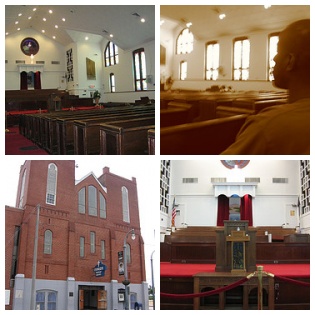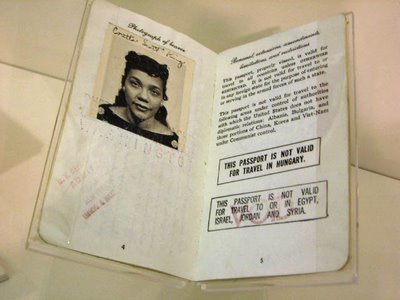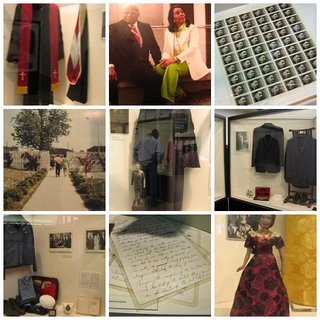Since we were there for nine days, we had a good amount of time to do touristy stuff, and I realized that out of all the times I'd been, I'd never visited The King Center, Auburn Avenue, or done anything related to the appreciation of Dr. King's life.
Martin Luther King, Jr. looks different at various stages in life. When I was a 3rd grader, he seemed to me like a saint. Because of him, I could sit where I wanted in the lunch room, drink from any water fountain, publicly play dolls with whomever I was of a mind to. By 9th grade, Dr. King had become a target for disdain (just like everything and everyone else) and we would suck our teeth and complain that we were tired of hearing about him, and the Civil Rights Movement, year after year. (It didn't help that the extent of what we learned was pretty much "We Shall Overcome" and that Dr. King had dogs set on him.) We reduced him to one speech, with the boys chortling refrains like "I have a dream, that you will one day, rise up... and let me get in your panties."
But somewhere in adulthood, you start hearing the truth about the man. It is not all pretty, but it is noble. When I began reading about his humor, his frailties, the ways in which he was afraid but did not act it, he became human to me. Since I know a little something about human limitation, in his humanness, he became an example. An example of how to hold to a calling; how to hold to what you believe is right, even in the face of great harm, and even when the cost of doing so is unthinkable.
For two days during our Atlanta trip, we ventured up and down Auburn Avenue, which conveniently features the National Historic Site, The King Center, Ebenezer Baptist Church, Fire Station No. 6, and Dr. King's birth home. I am proud of the way so many people, not least among them Coretta Scott King, have worked to keep all that Dr. King stood for alive and visible in the place where it all started. Here's a link to all the sites.
"The Freedom Road"
National Park Service King Visitor Center
450 Auburn Avenue
Our visit started where most do, in the National Park Service's King Visitor Center. The Center has a featured exhibit entitled "Courage To Lead," an audio-visual journey through major moments in Dr. King's life and the Civil Rights Movement. "Freedom Road" is a sculptural installation set in the center of the exhibit. It's an ode to the everyday people who marched, sang, sat-in, and even died in the Movement. It was one thing to pose with the figures, fun even, but I can only imagine the strength it took to participate in reality.National Park Service King Visitor Center
450 Auburn Avenue
From the Visitor Center, we went to Historic Ebenezer Baptist Church. A new Ebenezer has been built across the street, and Christine King, Dr. King's sister and the only surviving member of his immediate family (excluding his children, of course) still attends. Ebenezer was Dr. King's home church, the place he watched his father lead and preach, the place he where he honed his own minsterial skills. The day we visited, the "Mountaintop" speech played on a loop, and it was surreal to sit in the pews with Dr. King's voice washing over us, especially since we knew it was his last, and perhaps most prescient, speech.
What we didn't learn until later is that in 1974, Dr. King's mother, Alberta, was shot and killed right there in the church. Apparently the gunman intended to kill Rev. King, but hit Mrs. King while she sat playing the organ, and a deacon, instead.
 The King Center is where Dr. and Coretta King are interred.
The King Center is where Dr. and Coretta King are interred.The King Family's own labor of love, the Center features displays of Dr. and Mrs. King's clothing (including items worn by Dr. King during marches, and the suit he was wearing when he was stabbed in Harlem) family photographs -- many of which have rarely been shown to the public -- handwritten pages from Dr. King's speeches, and a special room dedicated to Dr. King's spiritual mentor, Mohandas Gandhi. One of the best things about the Center is that it sheds light on Coretta King's background. We think of her as Dr. King's dedicated wife, and she was that, but she was also an accomplished singer, pianist, and scholar by the time they met. After her husband's death, she served as a tireless crusader for human rights as well as the preserver of Dr. King's legacy.

 Perhaps my favorite part of the visit was Dr. King's birth home.
Perhaps my favorite part of the visit was Dr. King's birth home. Birth Home
Birth Home501 Auburn Avenue
It is owned by The King Center and maintained by the National Park Service. Tours are free and open to the public (and fill up quickly, which is why we went back a second day). They are led by park rangers, and ours was a very engaging and well-informed young man. The King family moved out when Dr. King was 12, and for years the house was divided into a two-unit rental. It has been restored to the way it was during Dr. King's boyhood, and some of the family's furnishings have been returned. No photography is allowed inside, but there's really nothing like being there. I loved hearing anecdotes about Dr. King and his siblings, how much he loved to play, how hard he tried to avoid piano lessons, and how close his family was. Apparently his parents weren't quite prepared for his arrival and didn't have a crib set up. They improvised and used a dresser drawer. It's amazing to see that dresser, right in the upstairs room where Dr. King was born.
 I hope that if you find yourself in Atlanta, you'll take a trip to Auburn Avenue and journey through the life of the great Dr. King.
I hope that if you find yourself in Atlanta, you'll take a trip to Auburn Avenue and journey through the life of the great Dr. King.







5 comments:
Nice tribute...great photos.
Next time you're in Memphis, visit the Lorraine Motel aka The National Civil Rights Museum. It's where Dr. King was assasinated. It is one of the most moving and expertly done museums in the country!
The Maya Lin monument (to Dr. King and Civil Rights) is there and I realllly want to see it, so I'm thinking Memphis will be next on my Dr. King tour.
First time I've heard how great the museum is. I'm def planning to go.
What great pictures!
Thank you, Kim. :)
A couple of months ago, shortly after Sis. Coretta's passing, her "absent" minded children put to auction Dr. King's estate at Sothebys. I purchased the catalogue for a mere $25. I don't think they are available anymore but you should try to find one somehow. They have many pictures of items that now reside at Morehouse (who ultimately had the entire auction removed and they purchased it outright).
Post a Comment